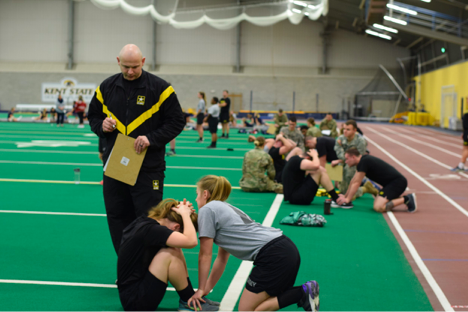Army ROTC cadets prepare for Army Physical Fitness Test

Cadets tackle the second portion of APFT, sit-ups, in the Field House Tuesday, Jan. 24, 2018.
January 24, 2018
A rainy Tuesday greeted Kent State’s Army ROTC as they prepared to test their physical strengths and abilities.
Each semester cadets are required to take the Army Physical Fitness Test to measure their physical performances, and they are graded on a set of skills that can affect their ranking in the ROTC program.
“There’s always a minimum to each event, but it really depends on how well you want to do because this test impacts how you’re ranked in the program,” 2nd Lt. Trevor Prindle said.
In accordance with the actual test, the practice was divided into three parts. Cadets completed push-ups, sit-ups and a two-mile run, which all contributed to measuring their muscule and overall endurance.
Many cadets polished their hard work with an occasional grunt and an exhale of relief once they completed their practice testing. Sweating and red-faced, they continued to pace themselves until they finished the task.
Though Tuesday’s diagnostic was just a rehearsal, it helped to prepare the cadets for the true drill. Although the bare minimum is needed to pass the practice test, Prindle said, students treat the physical as if it’s the real deal.
“I treat it the same as the actual test because I know if I fail now, then I’ll know what I need to work on and I can see my progress from what I need to work on to only do better,” said Amanda Keiser, a senior marketing major and a sophomore cadet.
The test is scored based on categories of age and gender, Keiser said. The older a cadet gets, the lower the minimums and the higher the maximums for a passing score — and these scores matter.
If the participants don’t pass the real APFT, there is the potential to be disenrolled from the program and lose the benefits that they receive with it, such as a stipend that they are given twice a month and scholarships that may have been obtained through the program.
In the beginning of the year, there was a 75 to 80 percent passing rate, Prindle said. Now, among the senior cadets this semester, a 100 percent passing rate is expected.
“Physical fitness is a big portion of the program, and it’s also a big portion of the Army, so we’re trying to teach the cadets that you have to be physically fit in order to have a successful career here,” Prindle said.
The cadets trained through workout videos such as INSANITY or P90X, said Keiser, while they also benefited from training on their own through exercises such as going running, doing sit-ups and lifting weights at the gym.
“Fitness is really like a holistic thing,” Prindle said. “If you’re physically fit then that’s gonna help you with your emotional state, your ability to concentrate on things like even school, or it’s just gonna help to be a big stress reliever as well.”
Mariah Hicks is the military and veterans reporter. Contact her at [email protected].
























